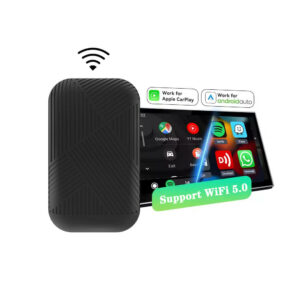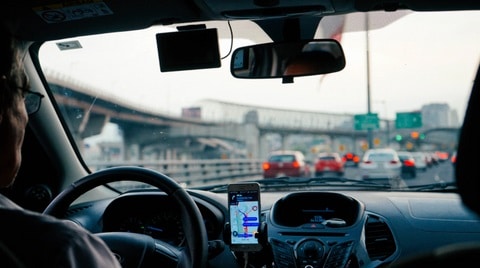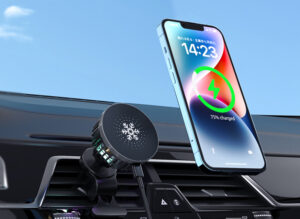Wireless Charging For Your Mobile Phone

What is Wireless Carplay adapter?
Regarding the Wireless CarPlay adapter, let’s first understand CarPlay. What is Carplay? In the center console of a car, there
Why is car wireless charging so slow?
Wireless charging for cars has become an increasingly popular feature in modern vehicles. The idea of simply placing your phone on the charging pad without any cables or connections is undeniably convenient. A common complaint about wireless charging in cars, however, is that it’s slow. In this article, we explore why wireless charging in cars is slow and discuss possible solutions to improve its efficiency.

Phone car wireless charging is a technology that allows you to charge your smartphone or other compatible device wirelessly while you’re driving. It works by using an electromagnetic field to transfer energy between two objects: the charging pad and the device being charged.
In a car, the charging pad is usually located in a designated area, such as a phone holder or a console, and the device being charged is placed on top of the pad. The charging pad is connected to the car’s power supply and uses induction to transfer power wirelessly to the device.
Wireless charging can be more convenient than traditional charging methods, as you don’t need to plug in your device every time you get in the car. It can also help reduce clutter and make your car’s interior look neater. However, it’s important to note that not all smartphones are compatible with wireless charging, and you may need to purchase a separate wireless charging adapter or case for your device to work with this technology.
Wireless charging technology has been around for several years, but it has become more popular in recent times due to the increasing number of devices that support it. Many new smartphones, such as the iPhone 12 and Samsung Galaxy S21, Xiaomi,Oppo,Huawei, Google Pixel 7 Pixel 7 pro 8 Pixel pro come with built-in wireless charging capabilities.
In addition to being more convenient than traditional wired charging, wireless charging can also help extend the life of your device’s charging port. Plugging and unplugging a charging cable repeatedly can put wear and tear on your device’s connector, which can eventually cause it to fail. With wireless charging, you can avoid this issue altogether.
There are a few different standards for wireless charging, including Qi and PMA. Qi is the most widely used standard, and is supported by many popular smartphones and other devices. PMA is less common, but is still used by some devices.
When it comes to phone car wireless charging, there are a variety of options available. Some cars come with built-in wireless charging pads, while others require you to purchase an aftermarket charging pad and install it yourself. There are also wireless charging phone holders and mounts available that can be attached to your car’s dashboard or air vents.
It’s worth noting that wireless charging is generally slower than wired charging, so if you’re in a hurry, you may want to stick with a traditional charging cable. However, for everyday use, wireless charging can be a convenient and hassle-free way to keep your phone charged while you’re on the go.
Compared to other wireless charging speeds, 15W wireless charging can be considered fast. Most wireless chargers on the market in the past have charged between 5W and 10W, so a 15W wireless charger is definitely at the high end of the charging speed spectrum. Of course there are now 20W fast in-car wireless charging as well.
It’s important to note that the actual charging speed you will experience will depend on a number of factors, including the particular device you are charging, the condition of the battery, and the quality of the charging pad you are using. In addition, wireless charging is typically slower than wired charging, so if you’re looking for the fastest possible charging speed, you may want to consider using a wired charger.
That said, 15W wireless charging is still a convenient and effective way to keep your device charged throughout the day. Wireless charging may take longer compared to wired chargers, but the convenience of not having to deal with tangled cables or damaged charging ports can make up for the slightly slower charging speed.

The charging speed of car wireless chargers may vary due to several factors, such as specific charging pads, the type of smartphone being charged, and the power output of the car charging system.
The charging speed of most car wireless chargers ranges from 5W to 10W, which is similar to the speed of many standard wireless chargers you use at home or in the office. However, some car wireless chargers can provide faster charging speeds of up to 15W or higher.
It is worth noting that wireless charging is usually slower than wired charging, so even with a fast wireless charger, you may not be able to achieve the same charging speed as a wired charger.
In addition, if you use your phone for wireless charging, the charging speed may be slower because the phone is also using a power source while charging.
Car wireless chargers are a convenient way to charge smartphones on the go, but if you need to quickly charge your phone, you may need to consider using a wired charger.
In order to solve the problem of slow wireless charging in cars, manufacturers are constantly developing new technologies. One such technique is the use of higher power output chargers, capable of delivering more energy to devices in less time. Additionally, advances in alignment and position detection help optimize the charging process, ensuring greater efficiency.
While car wireless charging holder may currently be slower than traditional wired charging methods, it offers unparalleled convenience and a neat experience. As the technology develops, wireless charging is expected to become faster and more efficient. While we wait for faster wireless charging speeds to become available, using chargers that ensure proper alignment, reduce interference, and use higher power outputs can help increase the speed at which phones charge in the car. As we eagerly await what the future holds, let’s embrace the convenience of wireless charging in cars while being mindful of its current limitations.

Regarding the Wireless CarPlay adapter, let’s first understand CarPlay. What is Carplay? In the center console of a car, there
1-1-300x152.jpg)
Dear partners and customers, We sincerely invite you to participate in the 2024 Spring Hong Kong Electronics Exhibition. As a

magnetic car holders in themselves do not disrupt wireless charging, unless the specific design places the magnet too close to
Phone: 0086-755-89812186
Email: sales@inputcn.com
Address: 518129 2F Building 1, Baoli Industrial Zone,
Bantian, Longgang District, Shenzhen, China.

